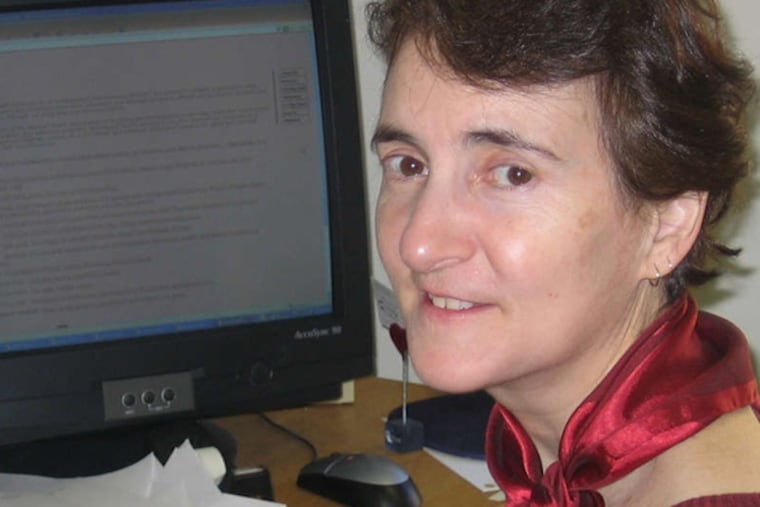
Almost 40 years ago, Susan Rogers came to Philadelphia to kill herself.
She never dreamed that she would go on to spend 29 years here, improving opportunities for the mentally ill and showing what recovery can be.
She is now being recognized for her work by Mental Health America, which will give her its top honor, the Clifford W. Beers Award, at its annual meeting next month.
Rogers, 66, is director of the National Mental Health Consumers' Self-Help Clearinghouse, which helps peer-run programs get started and thrive. She also directs special projects for the Mental Health Association of Southeastern Pennsylvania, which pushes for better care.
Debbie Plotnick, the group's state policy director, was among those who nominated Rogers, a former coworker.
"Susan is one of the number-one unsung heroes of the consumer movement," empowering patients to seek recovery and be independent.
She said Rogers has helped others find their voices while often shunning the spotlight. She has spoken openly of her own depression, which runs deep in her family.
Rogers came to the association in 1984, following her then-husband Joseph Rogers. An advocate with bipolar disorder, he was the agency's longtime director and is now its chief advocacy officer. He won the Beers award in 1990.
Asked why it took the group much longer to recognize her, Susan Rogers gave this characteristic response: "Joseph is a genius and visionary. I am not a genius and a visionary. I am a hard worker."
The two were married for 15 years, divorcing in 1992. He is still her supervisor, and they remain friends. She's friends with her second ex, too, and is now happily involved with another man whose warm family, including his ex, has embraced her in a way that she finds quite therapeutic.
She has learned to manage an illness that caught her unprepared in her 20s. A Hunter College English major with no career plan, she tried a series of "counterculture" jobs, including one at a dude ranch. She did some writing, but found herself thinking way too much about jumping out the windows of her 26th-floor office. At her family's urging, she stayed in a mental hospital for three weeks, then got a job as a recreational therapist in a mental health agency.
She decided, at 26, that she needed a career and entered a two-year nursing program. With no background, she felt overwhelmed and gave up. "I had never failed at anything before," she said. "I just had a meltdown."
She decided to leave New York to kill herself and chose Philadelphia during the bicentennial year, 1976. She had friends who had terrible physical disabilities after surviving suicide attempts, so she'd given the method much thought. She picked a high-rise hotel and sought a change when they offered her a room on the third floor. "Do you have anything higher up?" she asked "Maybe overlooking an alley." They obliged. The room had a window, and it opened.
For a month, she said, she paced. Finally, she stepped outside and onto an air conditioning unit. No matter how she tried, she couldn't make herself lose her balance. "I thought I might as well live," she said.
She started hitchhiking home. A young man from Allentown picked her up and took her to his place, where he spent three days telling her why she should live. She listened and checked herself back into the hospital. She went back to writing. Friends told her it would be bad for her to live alone, so she went to live in "a political collective." Joseph Rogers was there, too, and they soon bonded over hospitalization stories.
She now says firmly that "suicide is not the answer" and greatly regrets the time she spent here, cut off from her family while they worried. "There was no way to ever make that up to them," she said.
She's had a few depressive episodes since, but she saw them coming and sought help. She stays on an even keel with exercise, a healthy diet, friends, and fun: dancing, time with family, music, and books.
Part of what keeps her healthy is "meaningful employment." She has no plans to retire. She loves helping people learn to advocate for themselves and to see they can rise above the "bad messages" they've heard. There's still work to do.
"Our movement is so far behind where I wish it were," she said.